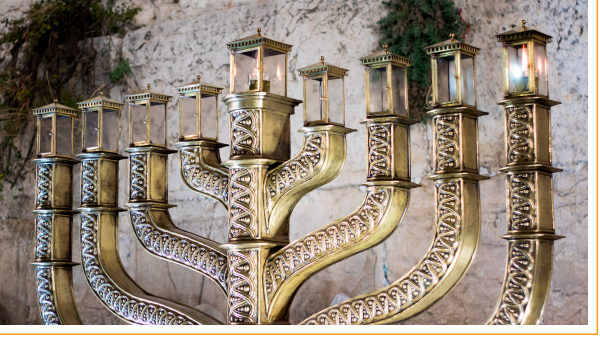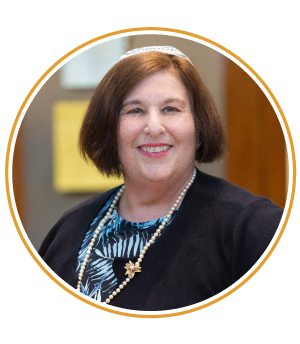 “You shall further instruct the Israelites to bring you clear oil of beaten olives for lighting, for kindling lamps regularly. Aaron and his sons shall set them up in the Tent of Meeting, outside the curtain which is over [the Ark of] the Pact, [to burn] from evening to morning before Adonai. It shall be a due from the Israelites for all time, throughout the ages. (Ex. 27: 20-21)”
“You shall further instruct the Israelites to bring you clear oil of beaten olives for lighting, for kindling lamps regularly. Aaron and his sons shall set them up in the Tent of Meeting, outside the curtain which is over [the Ark of] the Pact, [to burn] from evening to morning before Adonai. It shall be a due from the Israelites for all time, throughout the ages. (Ex. 27: 20-21)”
This week in Parshat Tetzaveh, Aaron and his sons are given instructions for kindling the Golden Menorah in the ancient Tabernacle. Hidden in the details, yet in plain view, is an important concept: bring your best for God. All the minutiae detailing the preparation of the priests for their eternal duties points to this idea. When we are told to bring clear pressed olive oil (shemen zayit zach) to light the menorah, we should understand that only the best and highest grade will do for lighting the Eternal’s light.
Olive oil was a commodity in the ancient world. But we are taught here in this verse to bring the finest, the highest grade. The Levites and the Cohanim owned no olive trees or fields. Instead this luscious, golden liquid would be brought as an offering from the people. This kind of olive oil was to have come from the very first drop of the pressed olives. According to our Sages we learn:
“The first crop is when the fully ripe olives are picked from the top of the tree; they are brought into the olive-press, are ground in a mill and put into baskets. The oil which oozes out is the first kind [of oil]. They are then pressed with the beam, and the oil which oozes out is the second kind” (BT, Menachot 86a).
The Talmud teaches us that this first grade is fit for the Menorah. It then describes two more olive oil crushes. In each instance, only the first pressing is fit for kindling the Menorah. In each case we are to bring the best, the clearest, the finest of the harvest to be used to symbolize God’s light in the world. Normally this fine quality of olive oil would be for eating or baking, not kindling a flame. You normally would use the highest grades for human consumption. Also this highest, clearest grade of oil would be the most expensive. So why “waste” this high grade oil on a lamp?
Our Rabbis answer this question in response to a related verse Leviticus 24:2:
The verse states: “Command the Israelite people, and they shall bring to you clear beaten olive oil for lighting for kindling lamps regularly (Lev. 24:2). Rabbi Shmuel bar brought “to you” to indicate that it is for their benefit and not for My benefit, as I do not need its light. (BT, Menachot 86b)
You will notice the verse in Exodus from our Parsha and this verse from Leviticus are almost exactly the same. The difference is that our Exodus verse is directed to Aaron and his sons and the Leviticus verse is directed to Moses. Ironically in this week’s Torah portion, Moses is never mentioned. (The first time since he appeared in the book of Exodus that he is not mentioned in a Torah portion!)
But in both the Exodus and Leviticus versions of this verse, the kindling of the Golden Menorah is not for God’s sake but it is a way to bring God’s light and illumination into the world. And this Divine Light only comes about when the people bring their best harvest as their offering. It takes human toil, human effort to make God’s light manifest.
The Talmud continues to remind us that the light of the Menorah is not to light up the Temple but to shine outward.
The Sages taught in a baraita: Typically, windows are constructed to widen toward the inside in order that the light from the outside would be dispersed throughout the room. For the Temple, God said: Make the windows narrow within and broad without, as I do not require its illumination. On the contrary, the light of the Temple is to be radiated outward. (BT, Menachot 86b)
The sweet olive oil that the Israelites harvest and process is a transformative process. Their gifts, their offering transforms the darkness into light, just as in the first act of Creation. Out of the chaos and void and darkness, God created the world with the words, “Let there be light”. (Gen:1:3)
In our day and time we ought to ask ourselves “Do we bring our best and finest to God and God’s house?” Or do we seek to cut corners? Do we try and see how little we can do or give and get away with it? How might we bring our best to help shine God’s light into the world? How might we shine the Divine light into dark corners of the world?
Today the synagogue is the heir to the Tabernacle of old. It is the place we Jews try to encounter God’s Divine light through prayer and study and sacred community The synagogue is the place we can kindle the Divine light and in turn shine it into the world through the practice of our mitzvot and our sacred teachings. We can bring the best offerings we have and the best of ourselves to ensure that the light of God emanates eternally from the Tent of Meeting of our day and time. The Golden Menorah was carried off by the Romans never to be seen again, but God’s light still shines through our acts of holiness, compassion, love and justice and dedication to our People and our God.


This week in Parshat Tetzaveh, Aaron and his sons are given instructions for kindling the Golden Menorah in the ancient Tabernacle. Hidden in the details, yet in plain view, is an important concept: bring your best for God. All the minutiae detailing the preparation of the priests for their eternal duties points to this idea. When we are told to bring clear pressed olive oil (shemen zayit zach) to light the menorah, we should understand that only the best and highest grade will do for lighting the Eternal’s light.
Olive oil was a commodity in the ancient world. But we are taught here in this verse to bring the finest, the highest grade. The Levites and the Cohanim owned no olive trees or fields. Instead this luscious, golden liquid would be brought as an offering from the people. This kind of olive oil was to have come from the very first drop of the pressed olives. According to our Sages we learn:
“The first crop is when the fully ripe olives are picked from the top of the tree; they are brought into the olive-press, are ground in a mill and put into baskets. The oil which oozes out is the first kind [of oil]. They are then pressed with the beam, and the oil which oozes out is the second kind” (BT, Menachot 86a).
The Talmud teaches us that this first grade is fit for the Menorah. It then describes two more olive oil crushes. In each instance, only the first pressing is fit for kindling the Menorah. In each case we are to bring the best, the clearest, the finest of the harvest to be used to symbolize God’s light in the world. Normally this fine quality of olive oil would be for eating or baking, not kindling a flame. You normally would use the highest grades for human consumption. Also this highest, clearest grade of oil would be the most expensive. So why “waste” this high grade oil on a lamp?
Our Rabbis answer this question in response to a related verse Leviticus 24:2:
The verse states: “Command the Israelite people, and they shall bring to you clear beaten olive oil for lighting for kindling lamps regularly (Lev. 24:2). Rabbi Shmuel bar brought “to you” to indicate that it is for their benefit and not for My benefit, as I do not need its light. (BT, Menachot 86b)
You will notice the verse in Exodus from our Parsha and this verse from Leviticus are almost exactly the same. The difference is that our Exodus verse is directed to Aaron and his sons and the Leviticus verse is directed to Moses. Ironically in this week’s Torah portion, Moses is never mentioned. (The first time since he appeared in the book of Exodus that he is not mentioned in a Torah portion!)
But in both the Exodus and Leviticus versions of this verse, the kindling of the Golden Menorah is not for God’s sake but it is a way to bring God’s light and illumination into the world. And this Divine Light only comes about when the people bring their best harvest as their offering. It takes human toil, human effort to make God’s light manifest.
The Talmud continues to remind us that the light of the Menorah is not to light up the Temple but to shine outward.
The Sages taught in a baraita: Typically, windows are constructed to widen toward the inside in order that the light from the outside would be dispersed throughout the room. For the Temple, God said: Make the windows narrow within and broad without, as I do not require its illumination. On the contrary, the light of the Temple is to be radiated outward. (BT, Menachot 86b)
The sweet olive oil that the Israelites harvest and process is a transformative process. Their gifts, their offering transforms the darkness into light, just as in the first act of Creation. Out of the chaos and void and darkness, God created the world with the words, “Let there be light”. (Gen:1:3)
In our day and time we ought to ask ourselves “Do we bring our best and finest to God and God’s house?” Or do we seek to cut corners? Do we try and see how little we can do or give and get away with it? How might we bring our best to help shine God’s light into the world? How might we shine the Divine light into dark corners of the world?
Today the synagogue is the heir to the Tabernacle of old. It is the place we Jews try to encounter God’s Divine light through prayer and study and sacred community The synagogue is the place we can kindle the Divine light and in turn shine it into the world through the practice of our mitzvot and our sacred teachings. We can bring the best offerings we have and the best of ourselves to ensure that the light of God emanates eternally from the Tent of Meeting of our day and time. The Golden Menorah was carried off by the Romans never to be seen again, but God’s light still shines through our acts of holiness, compassion, love and justice and dedication to our People and our God.